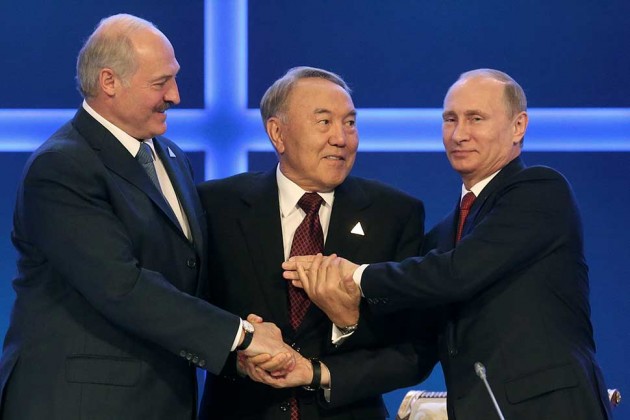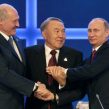
Russia, Kazakhstan and Belarus Form Eurasian Economic Union
Publication: Eurasia Daily Monitor Volume: 11 Issue: 100
By:

On May 29, in the Kazakhstani capital of Astana, the presidents of Russia, Kazakhstan and Belarus signed a treaty to form the Eurasian Economic Union (EaEU)—a post-Soviet reintegration project vigorously pursued by President Vladimir Putin. The EaEU will come into being next January, after the parliaments of the three nations ratify the treaty, which will be a formality since these countries’ parliaments are little more than rubber stamp assemblies. The EaEU is designed to allow the free movement of trade, capital and workers between the three states. After the signing, Belarusian President Alyaksandr Lukashenka said the EaEU does “not solve all existing trade problems,” but is a good basis for further political, military and social integration. Lukashenka has been pressing Moscow to allow Belarusian oil refineries to buy unlimited amounts of crude from Russia duty free and export their products to the West, while Moscow insists on quotas and tax payouts to limit the drain on its budget (https://www.interfax.ru/print.asp?sec=1447&id=378583).
Putin praised the new Union, while acknowledging that heated arguments preceded the signing ceremony. Putin insisted the new Union “will not undermine the sovereignty of its members” and will rapidly expand further, to include Armenia and possibly Kyrgyzstan. Putin wants the EaEU to develop a free trade agreement with Vietnam, strong cooperation with China, and possible future trade agreements with Israel and India (https://www.kremlin.ru/transcripts/45790). The Armenian president, Serzh Sargsyan, in Astana asked that his country’s treaty of accession be signed before June 15, so that Armenia could become a full EaEU member by next January, “since there are only technical matters left to settle” (https://www.regnum.ru/news/1808037.html).
Full EaEU membership will, among other things, allow Armenian nationals to work in Russia without work permits. The number of ethnic Armenians living legally in Russia has doubled to more than 1 million since the collapse of the Soviet Union (https://www.newsru.com/arch/russia/26nov2012/armyane.html). Armenia, which is in conflict with neighboring Azerbaijan and Turkey over the Karabakh region, relies on Russian aid and support. Sargsyan (59) was born in Karabakh and gained political importance as a military leader in the Karabakh war with Azerbaijan in the early 1990s. Reportedly Kazakhstani President Nursultan Nazarbayev insisted that the treaty of Armenian accession to the EaEU specifically include only internationally recognized Armenian territory, and to exclude the disputed Karabakh area (https://www.newsru.com/world/29may2014/astana.html).
Russian First Deputy Prime Minister Igor Shuvalov maintained in Astana that the current Ukrainian crisis did not influence the forming of the EaEU: “The crisis in Ukraine is local and internal—Ukrainians must decide themselves with whom they want to be in this world” (https://ria.ru/world/20140529/1009854248.html#ixzz3371qJKsM). Of course, the entire Ukrainian crisis was, in fact, sparked and exacerbated by Putin’s drive to reintegrate the post-Soviet space under Russian dominance. Without Ukraine, the Customs Union and now the follow-up EaEU seem lopsided, as Russian industry and, in particular, its defense industry is much more integrated with Ukraine than with Kazakhstan or Armenia. Moscow’s heavy-handed intervention in Ukraine, the annexation of Crimea, and support of pro-Russian armed separatists in Donetsk and Luhansk have frightened Putin’s EaEU partners—Lukashenka and Nazarbayev. But in Astana Shuvalov and Putin publicly insisted: “The new Union will not undermine anybody’s sovereignty.” Still, it is being reported that Kazakhstan insisted the EaEU be purely an economic alliance, excluding any joint foreign policy, export and border control institutions, a union parliament, or citizenship (https://www.newsru.com/arch/russia/26nov2012/armyane.html).
Publicly, the Russian president categorically rejects any intention to rebuild the Soviet Union, which collapsed in 1991, or to “recreate an empire” (https://www.kremlin.ru/news/21090). But the Russian public sees it differently after the annexation of Crimea: according to the latest poll by VtSIOM, a majority of Russians want a recreation of a “superpower like the USSR.” This is the first time a majority wants Russia to become a “superpower like the USSR” since 2003, when VtSIOM first began to ask this question. Before, most Russians wanted their country to become a “member of the club of most developed nations.” However, the aggressive anti-Western and anti-Ukrainian state-controlled media propaganda onslaught, which went into full swing last February, is profoundly changing the Russian nation. A patriotic media mobilization campaign and the euphoria originating from the annexation of Crimea make Russians believe they are at the center of a world where Moscow’s influence dominates—all other countries “either respect us [Russia] or hate us.” According to VtSIOM, 82 percent of Russians believe that “Russia today has overwhelming influence in the world” (https://kommersant.ru/doc/2481477).
The Crimea annexation euphoria and the TV propaganda assault skyrocketed Putin’s popularity. According to independent pollster Levada-Tsentr, this month Putin’s approval rating has reached some 83 percent, while last January it was 65 percent. Since January 2014, Putin’s job disapproval rating decreased from 34 to 16 percent. The approval of the Russian government and Prime Minister Dmitry Medvedev has increased correspondently from just over 40 to above 60 percent. Even the notoriously unpopular State Duma, which in January had an approval rating of some 36 percent, now scores 50 percent. Some 60 percent of Russians believe the country is moving in the right direction (https://www.interfax.ru/print.asp?sec=1448&id=378565).
Massive public support reassures the Kremlin that its policy of forceful reinstatement of Eurasian domination is right and encourages it to further defy the West. Russian Foreign Minister Sergei Lavrov, without hesitation, ridiculed President Barack Obama’s contention, made yesterday (May 28) in a West Point speech that US leadership “isolated Russia” and “a mobilization of world opinion and institutions served as a counterweight to Russian propaganda, Russian troops on the [Ukrainian] border, and armed militias” (https://www.interfax.ru/print.asp?sec=1446&id=378594). In fact, Russian propaganda is as effective and vicious as ever, the armed pro-Russian “militants” inside Ukraine still hold their ground, while the Russian troops on the Ukrainian border are indeed being partially pulled back for refitting, but this is temporary and can soon be reversed, according to Russian General Staff sources (https://top.rbc.ru/politics/29/05/2014/927058.shtml#xtor=AL-).
Meanwhile, Putin has been handing out medals to TV journalists who have been so effectively carrying out his propaganda offensive. This month, it was reported that 342 journalists were issued state and military medals for covering the annexation of Crimea and the crisis in Ukraine (www.vedomosti.ru/newsline/news/26207781/342-zhurnalista). As the conflict continues, more pro-Kremlin journalists are being honored by the Kremlin (https://www.interfax.ru/print.asp?sec=1448&id=378467). The propaganda war continues unabated: on Russian soil and in southeastern Ukraine, Obama’s claim of US leadership sounds unwarranted.




